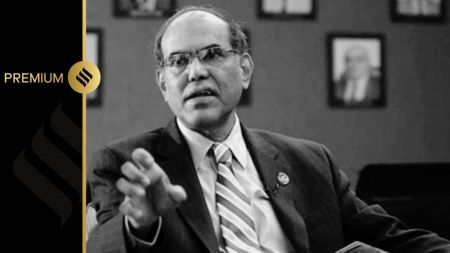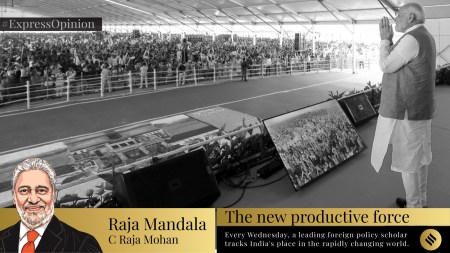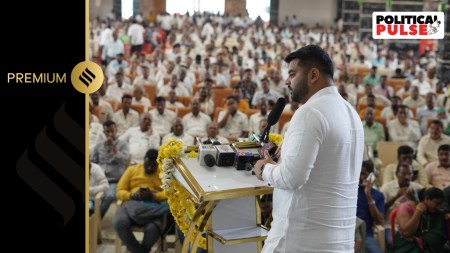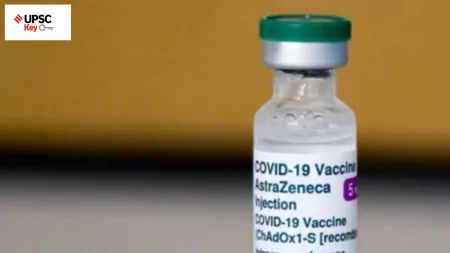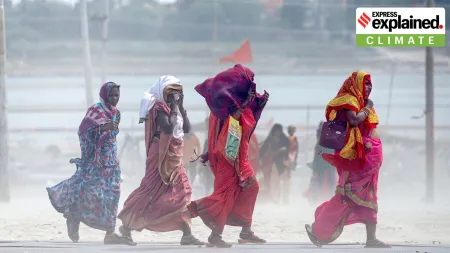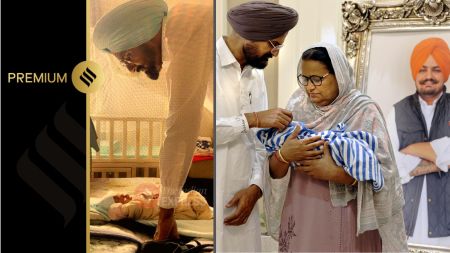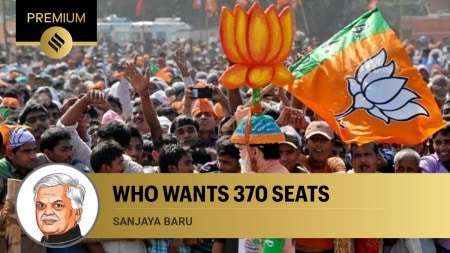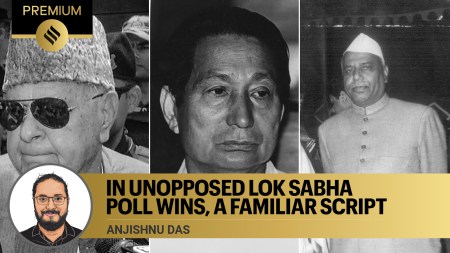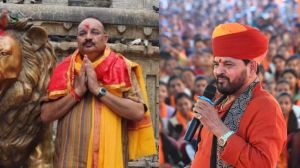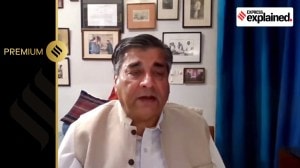- India
- International
During Mahinda Rajapaksa’s India visit, New Delhi likely to raise Sri Lankan Hindu Tamil’s issues
During Mahinda Rajapaksa’s India visit, New Delhi is likely to talk to Colombo on the Tamil issue and counterbalance Beijing’s influence in Indian Ocean
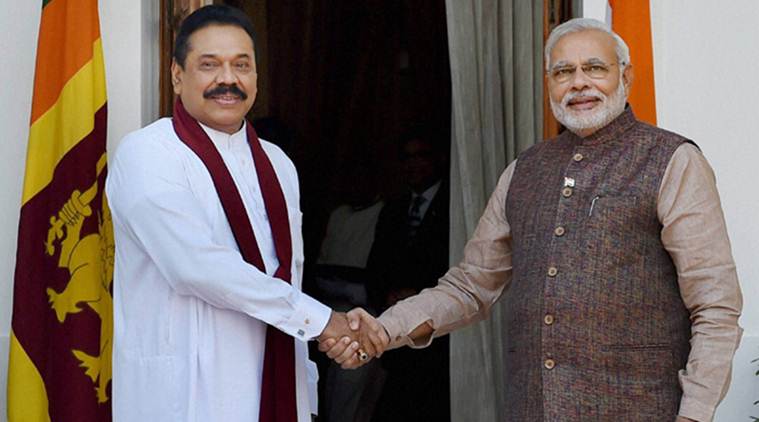 PM Narendra Modi with Sri Lankan Prime Minister Mahinda Rajapaksa. (File)
PM Narendra Modi with Sri Lankan Prime Minister Mahinda Rajapaksa. (File)
Sri Lankan Prime Minister Mahinda Rajapaksa’s official visit to India, that begins on Friday, is taking place a few months after he assumed office and his brother Gotabaya Rajapaksa was sworn in as president. The two were voted to office on a Sinhala nationalist wave, a sentiment that isn’t primarily anti-Tamil this time, but a fallout of the Easter attacks on Christian shrines, including the Saint Anthony’s shrine, in April last year. The attacks had killed more than 250 people, six months before the elections. The polarisation worked in favour of the Rajapaksas vis-à-vis Sri Lanka’s 10 per cent Muslim population, mostly Tamils, who are especially numerous on the country’s east coast.
The “Easter tragedy” remains mysterious. The Sri Lankan authorities did not pay adequate attention to the warning signals that India had sent them about an imminent attack. Moreover, on September 22, 2019, Gotabaya’s official spokesperson admitted in an interview that Zahran Hashmi, the chief architect of the Easter tragedy, had been supported by Gotabaya himself when he was the defence secretary. Whatever the circumstances and politics behind this massacre, it fostered ethno-religious polarisation before the elections.
Muslims were targeted by the Bodu Bala Sena. For instance its chief, Galagoda Aththe Gnanasara, is reported to have said: “If the (Buddhists) monks could get the support of even 7,000 temples in Sri Lanka for one political front during the elections, and each temple can garner 10,000 votes for that front, there could be a Sinhala government”. Today Sri Lanka’s government has 49 Sinhalese Buddhists, two Tamil Hindus and no Muslims.
While Muslims have become the number one scapegoat for the Easter tragedy, the Rajapaksas have not tried to engage the Hindu Tamils, who voted against the duo. Hindu Tamils, who make about 11 per cent of Sri Lanka’s population, have had an acrimonious relationship with Mahinda Rajapaksa ever since he wiped out the LTTE in 2009 — many members of the community became collateral victims in the process. Gotabaya was the defence secretary at that time. The Hindu Tamil factor may complicate India-Sri Lanka relations.

Exclusion and ethnic strife: Story of Sri Lanka’s citizenship law
The China factor is likely to aggravate the complication: The Rajapaksas are known to be pro-Sri Lanka. Mahinda Rajapaksa was largely responsible for opening Sri Lanka to massive — and strategic — Chinese investments. The Hambantota Port and 15,000 acres have been conceded to China on a 99-year lease, causing considerable consternation in New Delhi, which apprehends that this deep sea port could be used for military purposes, and not just trade. The deal was put on a hold by former PM Ranil Wikremasinghe but the present dispensation wants it to be restored. This Sri Lanka-China axis was the main reason why India is reported to have helped the opposition to the Rajapaksas before the 2015 election. In fact, Mahinda had accused India’s top espionage agency for engineering his defeat in 2015.
New Delhi has tried to engage the new Sri Lankan government after the Rajapaksas assumed office. India’s foreign minister S Jaishankar, landed in Sri Lanka on November 20, 2019 to invite Gotabaya for his first visit to India — rather than to China. Gotabaya visited New Delhi for three days in late November last year. Jaishankar is said to have told Gotabaya that India expects his government to treat Tamils with dignity in the process of reconciliation. There is speculation that India might appoint an ambassador of Tamil origin to Colombo.
India’s effort were also designed to thwart China extending its influence in Sri Lanka at a time when the Narendra Modi administration is trying to counter Beijing’s clout in the Indian Ocean. Modi’s visited on May 30, 2019, just after beginning his second tenure as PM. Few days later, Modi visited the Saint Anthony’s shrine to show his solidarity with terrorism-affected Sri Lanka.
The Indian PM went further when Gotabaya Rajapaksa visited New Delhi: He announced a $50 million line of credit for security and counter-terrorism and another $400 million for development and infrastructure projects in Sri Lanka. Modi did not miss the opportunity to explain that the counter-terror fund would further strengthen cooperation against terrorism after making an obvious reference to Easter bombings. In return, Gotabaya allayed India’s fears on China by saying that Sri Lanka would not allow a third country to affect Sri Lanka-India ties.
Opinion | Nirumpama Subramanian writes: How to regain friends in Sri Lanka
This question will again be part of the conversation that Mahinda will have in Delhi during his visit. But other issues are likely to be raised in relation to the domestic situation in Sri Lanka. In the Citizenship Amendment Act the Indian Parliament passed in 2019, the persecuted minorities of Sri Lanka are not taken into account. However, the Hindu Tamils of Sri Lanka are feeling insecure again.
They look at Rajapaksa brothers as hostile to minorities. After all, when the new president took oath — in Anuradhapura, the historical capital of the pre-British Raj Buddhist kings — he publicly regretted that the minorities had not supported him during the elections. Moreover, the BBS leader Gnanasara declared that he would disband his organisation if the Rajapaksas win the general election in April 2020 because he would then consider his mission to have been accomplished. India may not wait for these elections to show its interest in protecting the minorities of Sri Lanka in order to be true to “India’s tradition to shelter d persecuted in d neighbourhood” as BJP General Secretary Ram Madhav tweeted after the passing of the CAA on December 5, 2019.
This article first appeared in the print edition on February 7, 2020 under the title ‘Keeping the southern neighbour engaged’. Jaffrelot is senior research fellow at CERI-Sciences Po/CNRS, Paris and professor of Indian Politics and Sociology at King’s India Institute. Rizvi is information commissioner, Uttar Pradesh
40 Years Ago
EXPRESS OPINION
More Explained
May 02: Latest News
- 01
- 02
- 03
- 04
- 05


